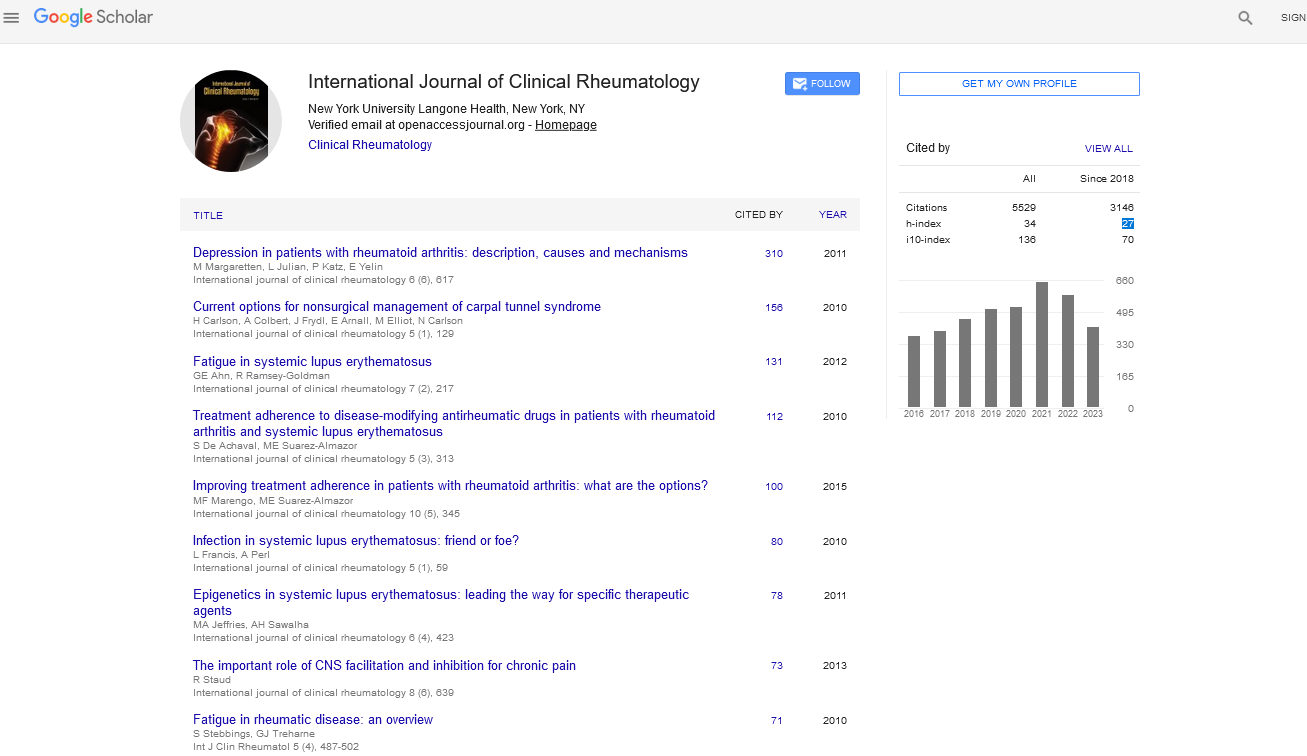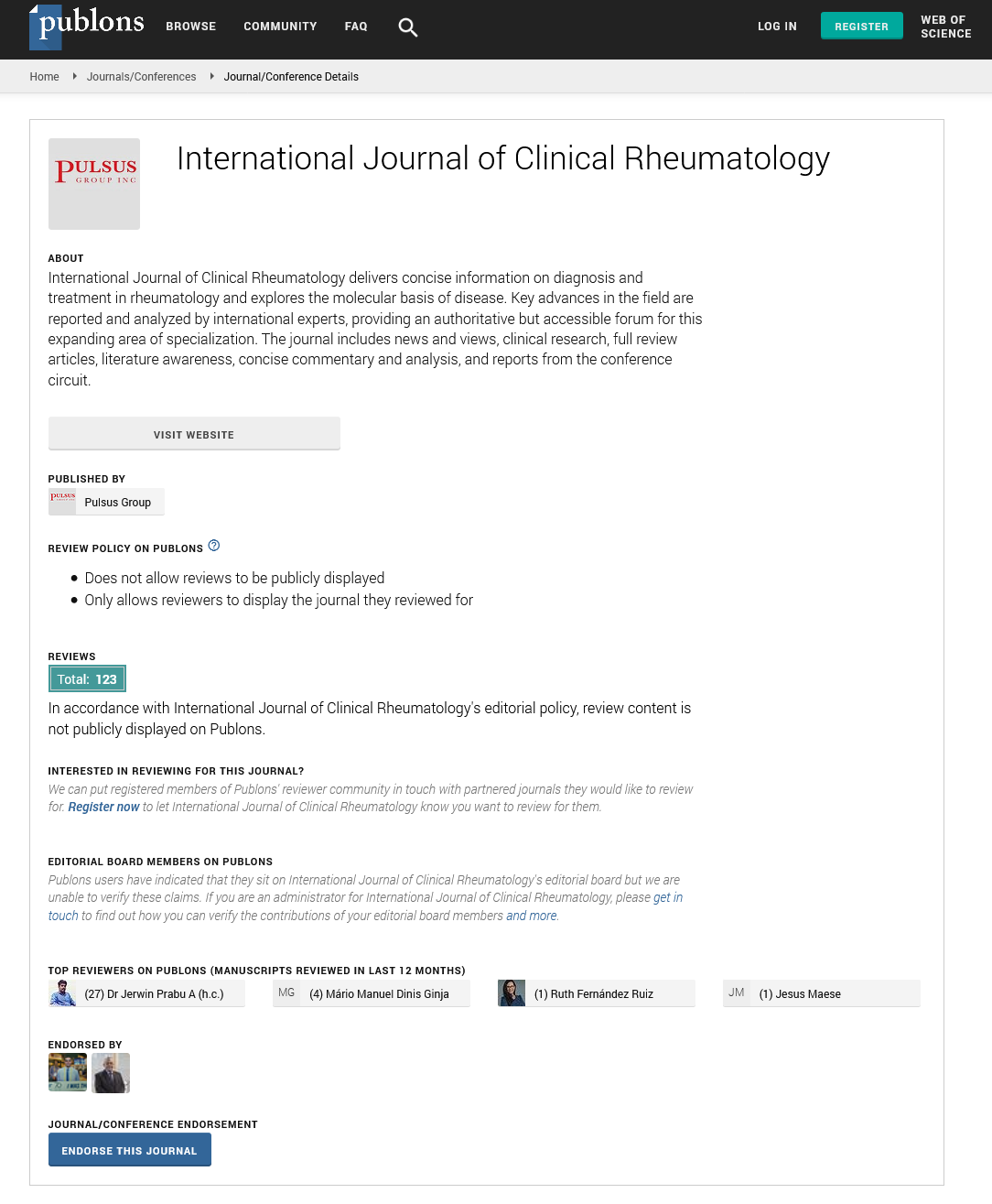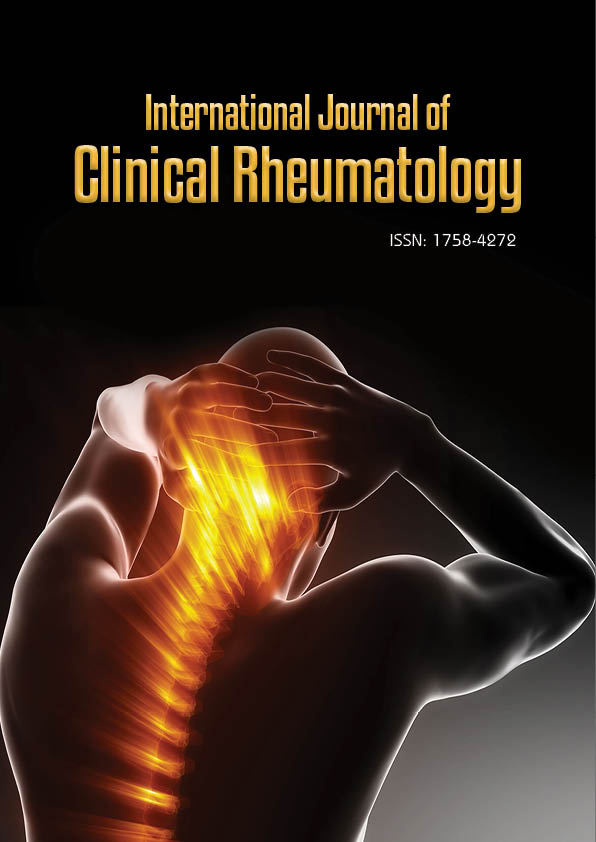Review Article - International Journal of Clinical Rheumatology (2022) Volume 17, Issue 12
Dutch rheumatologists and oncologists' experiences and attitudes regarding the health-related Internet use of their patients
John Dufort*
Department of rheumatology Australia
Received: 06-Dec-2022, Manuscript No. fmijcr-22-84360; b: 09-Dec-2022, Pre-QC No. fmijcr-22-84360 (PQ); Reviewed: 20-Dec-2022, QC No. fmijcr-22-84360; Revised: 24-Dec-2022, Manuscript No. fmijcr-22-84360 (R); Published: 30-Dec-2022, DOI: 10.37532/1758-4272.2022.17(12).195- 197Abstract
The demographics, experiences with patients' health-related Internet use, referral behavior, and attitudes toward the consequences of patients' health-related Internet use were all included in the questionnaire. The rate of responses was. Two of these respondents were oncologists and rheumatologists. Practically all doctors experienced their patients raising data from the Web during a conference. However, they were not regularly confronted with their patients' health-related Internet use. The effects of patients' health-related Internet use, the doctor-patient relationship, and health care were moderately well-received by doctors. Compared to rheumatologists, oncologists were significantly less optimistic regarding the effects of health-related Internet use. The majority of doctors had only occasionally referred patients to health-related websites. It is difficult for the majority of doctors to keep up with patient-safe websites on the Internet. Although they rarely direct patients to relevant websites, doctors have a moderately positive attitude toward their patients' health-related Internet use. Physicians may be able to refer more patients if they have access to an up-to-date website with patient-approved websites.
Keywords
Attitudes • Internet • Oncologists • Online health information • Patients • Rheumatologists
Introduction
The Patients, who utilize the Web feel engaged in dealing with their wellbeing, feel more associated with organizations with their doctors and in arriving at conclusions about their treatment [1]. Concerns have been raised, however, regarding the use of the Internet for health-related information. Patients may misunderstand information they find on the Internet or encounter false information, both of which can give them a false sense of control and knowledge. Patients are increasingly requesting health-related information from the Internet, which is evident in the doctors' daily practice [2]. Recently, it was demonstrated that only 20% of patients who search the Internet for health-related information discuss their findings with their physicians. Patients cite the fear of being perceived as challenging their physician as the primary reason they avoid discussing health-related Internet use. As a result, it's critical to learn more about physicians' perspectives on their patients' health-related Internet use [3]. The basic role of this study was to investigate the encounters of rheumatologists and oncologists with their patients' wellbeing related Web use and their perspectives towards the results thereof. We were also interested in whether and how frequently doctors referred patients to healthrelated websites it is reasonable to anticipate an even larger proportion of patients in the not-too-distant future due to the prevalence of younger patients searching online for health-related information. A new report among new rheumatology patients going to rheumatology centers showed that of them looked through the Web to look into their side effects or thought condition before their most memorable arrangement [4].
Method and sample
Our earlier research on online peer support groups served as sources for the questionnaire's items. Five medical professionals participated in the pre-testing of a draft version of the questionnaire. In light of their responses, some literary vagary and reaction choices were adjusted [5]. The following topics were covered in the final questionnaire. Experiences with patients' Internet use the doctors were asked to estimate the number of patients who used the Internet to look up health-related information. The following responses were available to respondents. In addition, the doctors were asked how frequently patients had discussed their health-related Internet use with them over the previous month and how frequently patients had requested referrals to healthrelated websites [6]. On a five-point scale ranging from "never" to "almost daily," respondents could respond. Behavior in referrals the physicians was asked how frequently they had referred patients to health-related websites and online support groups in the previous month. On a five-point scale ranging from never to almost daily, respondents could respond. In addition, the doctors were asked how often they had visited health-related websites and online support groups in the previous month. On a five-point scale ranging from never to almost daily, respondents could respond.
How doctors refer patients
Online support groups and health-related websites were rarely visited by physicians themselves. The majority of doctors had never or only once referred a patient to a health-related website [7]. The majority of rheumatologists and oncologists had never or rarely referred a patient to an online support group. In a freetext response, some of the doctors said that they weren't the ones who referred their patients: The rheumatology nurse at our center is in charge of directing patients to relevant websites. Oncologists were more likely than rheumatologists to refer their patients to websites. Patients were referred to websites by female physicians more frequently than male physicians. Age was not found to be related [8].
Discussion
Physicians are becoming more aware of their patients' use of the Internet. The doctors' assessments compared with the level of wellbeing related Web utilize tracked down in our new review among Dutch patients. This study showed that of the patients with rheumatoid joint inflammation of the patients with bosom disease, and of the patients with fibromyalgia had utilized the Web to look for wellbeing related data. This is as opposed to Potts and Wyatt who found that doctors in the UK likely misjudge the level of patients who involved the Web for wellbeing related reasons [9]. The majority of them stated that only a very small percentage of their patients (1-2%) did so. During a consultation, almost all doctors said that patients brought up information from the Internet. Since, this suggests an increase. Found in their 2003 study that when a patient brought information from the Internet to a consultation, only one of the doctors had experienced an incident. While our study revealed that the majority of physicians had encountered health-related Internet use on a regular basis over the past month, this was still a relatively uncommon occurrence for the majority of these physicians. However, our research did demonstrate that this was still not a regular occurrence [10].
Conclusion
Despite this, it was still not every day. Regarding the effects of health-related Internet use on their patients, the physician-patient relationship, and health care, physicians expressed moderate optimism. The doctors said that they can deal with the problems they think using the Internet for health reasons can cause. However, despite the recommendations in the literature for doctors to help their patients use the Internet, doctors rarely direct patients to health-related websites. Perhaps providing a current list of patient-approved websites would encourage physicians to refer patients.
References
- Gordon MM, Capell HA, Madhok R. The use of the Internet as a resource for health information among patients attending a rheumatology clinic. Rheumatology. 41, 1402–1405 (2002).
- Kim HA, Bae YD, Seo YI. Arthritis information on the Web and its influence on patients and physicians: a Korean study. Clin Exp Rheumatol.22, 49–54 (2004).
- Neame R, Hammond A, Deighton C. Need for information and for involvement in decision making among patients with rheumatoid arthritis: a questionnaire survey. Arthritis Rheum.53, 249–255 (2005).
- Richter JG, Becker A, Specker C et al. Disease-oriented Internet use in outpatients with inflammatory rheumatic diseases. Z Rheumatol.63, 216–22 (2004).
- Hay MC, Cadigan RJ, Khanna D et al. Prepared patients: internet information seeking by new rheumatology patients. Arthritis Rheum.59, 575–582 (2008).
- Bass SB, Ruzek SB, Gordon TF et al. Relationship of Internet health information use with patient behavior and self-efficacy: experiences of newly diagnosed cancer patients who contact the National Cancer Institute’s Cancer Information Service. J Health Commun.11, 219–236 (2006).
- Van Lankveld WG, Derks AM. Disease related use of the internet in chronically ill adults: current and expected use. Ann Rheum Dis.65, 121–123 (2006).
- Suarez-Almazor ME, Kendall CJ, Dorgan M. Surfing the net information on the World Wide Web for persons with arthritis: patient empowerment or patient deceit. J Rheumatol.28, 185–191 (2001).
- Diaz JA, Sciamanna CN, Evangelou E et al. Brief report: what types of Internet guidance do patients want from their physicians. J Gen Intern Med. 20, 683–685 (2005).
- Dickerson S, Reinhart AM, Feeley TH et al. Patient Internet use for health information at three urban primary care clinics. J Am Med Inform Assoc.11, 499–504 (2004).
Indexed at, Google Scholar, Crossref
Indexed at, Google Scholar, Crossref
Indexed at, Google Scholar, Crossref
Indexed at, Google Scholar, Crossref
Indexed at, Google Scholar, Crossref
Indexed at, Google Scholar, Crossref
Indexed at, Google Scholar, Crossref


